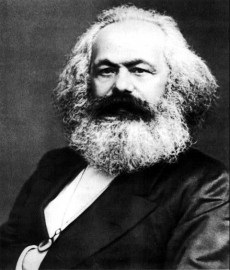
I was at an interesting discussion on Thursday evening on Marx and modernity. I went along not knowing much about Marx – I seemed to be the only one present who hadn’t studied Capital in great detail, but that didn’t matter. The point wasn’t the uses to which Marxist thought have been put, but the context in which that thought first emerged.
Karl Marx started out as a radical journalist in the Cologne in the 1840s. He wanted to write about the changes going on in the world around him and why they were happening. The Prussian authorities (the Rhineland was part of Prussia, then) seemed content to allow him to write about events in other countries – France, Italy, and so on – but not about events at home. His readers must have received rather a skewed view of the world – everywhere there is chaos, but here.
And the 1840s must have been an exciting time to write about. There were nationalist tensions in Germany, Italy and Hungary, for example (in those days, nationalism was on the same side as democracy, as the alternative to hegemony and empire; the debate about the future of Europe is still living with the consequences of this today); a customs union had been created to cover most of Germany; large-scale European emigration to the New World was getting under way; and perhaps most important of all, the Industrial Revolution was spreading across Europe.
We think of the Rhineland and the Ruhr as a region of industrial development. Back then, it was still rural. Krupp had been founded on a greenfield site in 1810 and was still growing. Huge changes were going in politics and economics – in Prussia as much as, if not more than, anywhere else – and Marx wanted to study them.
I am not going to rehearse where he might have gone wrong – the point here is the context, and the context is that these things could be studied. Economics and politics were human endeavours that had been created and could be changed. Immutable forces such as monarchy and the church were no longer immutable. Poverty was not an inevitable part of a life but the result of one particular distribution of wealth within society: there are other ways of distributing wealth.
All these issues are familiar to us today, only the immutable forces have changed. The church and the monarchy have been replaced by globalisation and the market. Society and the public interest are asked to prostrate themselves before these new forces. Most readers of this blog will share my dislike of this argument.
The global marketplace is only unregulated because our political system has chosen not to regulate it. A choice has been made not to do so: the alternative choice can also be made. The division of the world into sovereign states is likewise a choice. Sovereignty can be pooled – it does not have to be absolute.
